Related Research Articles
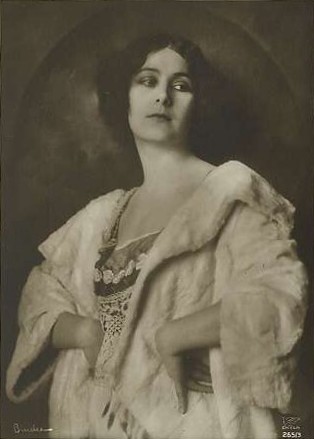
Lil Dagover was a German actress whose film career spanned between 1913 and 1979. She was one of the most popular and recognized film actresses in the Weimar Republic.
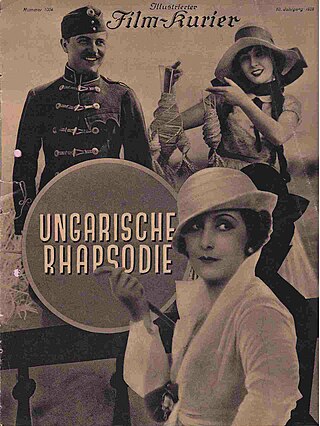
Hungarian Rhapsody is a 1928 German silent drama film directed by Hanns Schwarz and starring Lil Dagover, Willy Fritsch and Dita Parlo. It depicts the life of an impoverished Hungarian aristocrat.

Bismarck is a 1940 German historical film directed by Wolfgang Liebeneiner and starring Paul Hartmann, Friedrich Kayßler, and Lil Dagover.
Congress Dances is a 1932 German comedy film directed by Erik Charell and starring Lilian Harvey, Conrad Veidt and Henri Garat. It was an English-language version of the German film Der Kongreß tanzt. A separate French-language version Le congrès s'amuse was also made. It is centered on the Congress of Vienna, where an Austrian commoner is mistaken for the Tsar of Russia.
Playing with Fire is a 1921 German silent comedy-drama film directed by Georg Kroll and Robert Wiene and starring Diana Karenne, Vasilij Vronski, Ossip Runitsch, and Anton Edthofer. It was shot at the Babelsberg Studios in Berlin. The film received a generally positive reception from critics, although some were doubtful about the blending of farce and tragedy.

The Night of Queen Isabeau is a 1920 German silent historical drama film directed by Robert Wiene and starring Fern Andra, Fritz Kortner, Hans Heinrich von Twardowski and Elsa Wagner. The film depicts the marriage between the mad Charles VI of France and his wife Queen Isabeau. It was shot at the Babelsberg Studios in Berlin. The film is now considered a lost film, but contemporary reviews praised Wiene's direction. The story revolves around insanity, a common theme in his films.

The Secret of Bombay is a 1921 German silent adventure film directed by Artur Holz and starring Conrad Veidt, Lil Dagover and Hermann Böttcher. It was shot at the Babelsberg Studios in Berlin. It premiered at the Marmorhaus in Berlin on 6 January 1921.
The Humble Man and the Chanteuse is a 1925 German silent film directed by E. A. Dupont and starring Lil Dagover, Olga Limburg and Margarete Kupfer. It was based on a novel by Felix Hollaender.
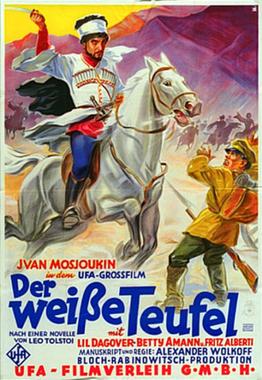
The White Devil is a 1930 German historical drama film directed by Alexandre Volkoff and starring Ivan Mozzhukhin, Lil Dagover and Betty Amann. It was based on Leo Tolstoy's 1912 novella Hadji Murat. It was originally made as a silent film, with a soundtrack added later. Anatole Litvak worked as the film's assistant director and production manager. It was shot at the Babelsberg Studios in Berlin. The film's sets were designed by the art directors Alexandre Lochakoff and Vladimir Meingard. After location shooting in Nice, Switzerland and the French Alps during 1929, it premiered at the Ufa-Palast am Zoo in January 1930.

The Brothers Schellenberg is a 1926 German silent drama film directed by Karl Grune and starring Conrad Veidt, Lil Dagover and Liane Haid. It was shot at the Babelsberg Studios in Berlin with sets designed by the art director Karl Görge. It was based on a novel by Bernhard Kellermann. It premiered at the Palast-am-Zoo.

Comedy of the Heart is a 1924 German silent romance film directed by Rochus Gliese and starring Lil Dagover, Nigel Barrie and Alexander Murski. It premiered at the Tauentzienpalast in Berlin on 30 September 1924. It was based on a novella by Sophie Hoechstetter. The film was one of UFA's major releases of the 1923-1925 boom period. It was made at the Babelsberg Studio.

The Higher Command is a 1935 German historical film directed by Gerhard Lamprecht and starring Lil Dagover, Karl Ludwig Diehl and Heli Finkenzeller. Produced and distributed by UFA, it was shot at the company's Babelsberg Studios in Potsdam. The film's sets were designed by the art directors Otto Erdmann and Hans Sohnle.
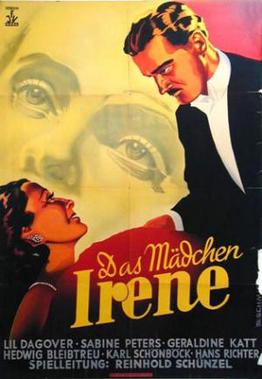
The Girl Irene is a 1936 German drama film directed by Reinhold Schünzel and starring Lil Dagover, Sabine Peters and Geraldine Katt. It is based on the British play Sixteen by Aimée Stuart about the widowed mother of a middle class family who falls in love, provoking the jealousy of her daughter. It was shot at the Babelsberg and Tempelhof Studios of AG|UFA in Berlin with location shooting taking place in London, Monte Carlo and Paris as well as around the German capital. The film's sets were designed by the art directors Ludwig Reiber and Walter Reimann.

The Mayor of Zalamea is a 1920 German silent drama film directed by Ludwig Berger and starring Lil Dagover, Albert Steinrück and Agnes Straub. The film was based on Pedro Calderón de la Barca's historic Spanish play of the same name. It was shot at the Babelsberg Studios in Berlin with sets designed by the art director Hermann Warm. It was Berger's debut as a director.

Princess Suwarin is a 1923 German silent film directed by Johannes Guter and starring Lil Dagover, Heinrich Schroth and Xenia Desni. It was shot at the Babelsberg Studios of Decla-Bioscop in Berlin. The film's sets were designed by the art director Erich Czerwonski.
The Woman in Heaven is a 1920 German silent film directed by Johannes Guter and starring Lil Dagover and Werner Krauss.

The Kwannon of Okadera is a 1920 German silent film directed by Carl Froelich and starring Lil Dagover and Werner Krauss. Produced by Erich Pommer of Decla-Bioscop it was shot at the Babelsberg Studios in Berlin and premiered in the city's Marmorhaus.
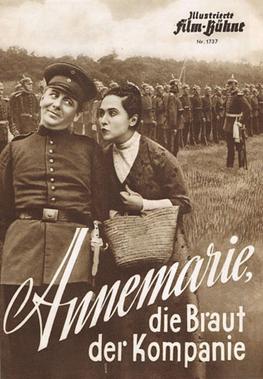
Annemarie, the Bride of the Company is a 1932 German comedy film directed by Carl Boese and starring Lucie Englisch, Paul Heidemann and Albert Paulig. It was shot at the Babelsberg Studios in Berlin. The film's sets were designed by the art director Willi Herrmann.
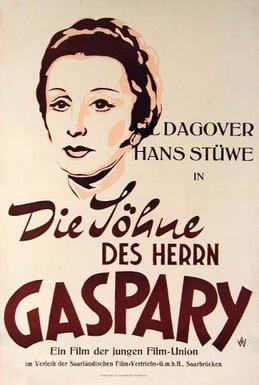
Gaspary's Sons is a 1948 German drama film directed by Rolf Meyer and starring Lil Dagover, Hans Stüwe and Inge Landgut. It was shot at the Bendestorf Studios near Hamburg and on location at Kleinwalsertal in western Austria. The film's sets were designed by the art director Erich Grave.

The White Roses of Ravensberg is a 1919 German silent drama film directed by and starring Nils Olaf Chrisander. It is based on the 1896 novel by Eufemia von Adlersfeld-Ballestrem which was later adapted into a 1929 film of the same title.